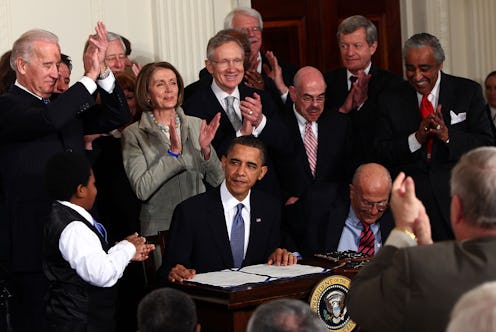Life
Obama's ACA Anniversary Statement Shows Why It's So Hard To Repeal

Thursday marks the seven year anniversary of the Affordable Care Act, President Obama's signature health care law, passed in 2010. It also marks the day Republicans were expected to vote on whether to repeal the ACA, but Republicans postponed that vote, realizing it probably wouldn't succeed. They're discovering, after seven years, that repealing and replacing Obamacare is easier said than done.
At this point, the vote on the Republican health plan is in serious jeopardy. As the first major legislative priority of the Trump administration, after seven years straight of Republican promises to "repeal and replace Obamacare," it would be massively embarrassing if the bill failed. But looking back at the accomplishments of the Obama's healthcare bill over seven years, which the former president tweeted out Thursday morning for the anniversary, it's clear why it's so hard to undo them.
Obama's statement highlights how hard it was to even get this far. He points to Teddy Roosevelt as the first president to try to pass universal healthcare, an attempt that was repeated by every Democratic president and several Republicans. It was only when Obama came into office with 60 Democratic votes in the Senate, a large majority in the House, and large popularity that he was able to pass a large-scale reform of the healthcare industry. Even then, he was barely able to get it done, and it came with a devastating loss in the 2010 midterms as the public soured on the bill.
The Republicans have no such majorities, and their president is more unpopular at this point than any in recent history. But perhaps even more than the political consequences, Republicans face the nearly impossible task of trying to unwind a bill that really has fundamentally changed healthcare, and while some of those changes haven't been particularly popular, most of them have.
As President Obama points out, the biggest change caused by the Affordable Care Act was in the number of people covered by health insurance — a result mostly in changes that the bill made to government subsidies to people who couldn't afford insurance, the individual mandate requiring insurance, and the requirement that insurance cover pre-existing conditions. Jason Furman, who served in the Obama administration as Chair of the Council of Economic Advisers, used the anniversary to tweet out some data showing this massive change.
The Republican attempt to repeal the bill is dealing with the difficulty of reversing that progress. The bill was pulled back from the "full repeal" that many conservatives originally wanted after town halls where constituents pressured their members of Congress not to take away their healthcare, making it harder for conservatives to support it. The actual bill has become massively unpopular after a report by Congressional Budget Office found it would take health insurance away from 24 million people. And that possibility has turned even some Republicans who have opposed Obamacare against Republican attempts to end it.
Other elements of the ACA are proving just as hard. A last minute attempt by hardline Republicans to remove requirements of "Essential Health Benefits" to be included in all plans hit a backlash. Even Trump's legendary "dealmaking" skills have struck out.
Back when Barack Obama signed the ACA into law, Joe Biden famously got caught on a hot mic, telling the president exactly what kind of big deal this was.
It's exactly seven years later, and as Republicans make a mess of trying to accomplish something they've spent all of that time trying, it's safe to say that Biden may have been understating it.